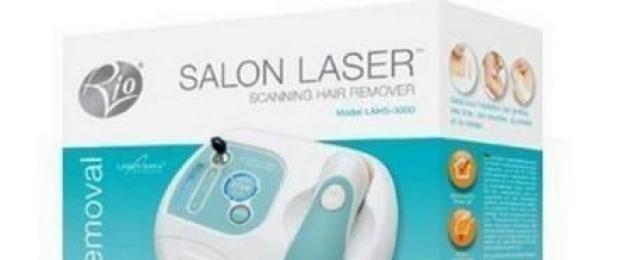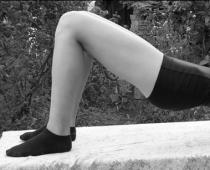In an effort to forget about unwanted hair once and for all, many methods have been tried: someone places all hopes on traditional medicine and stubbornly prepares tinctures from pine nuts and datura seeds, more pragmatic tend to epilation or laser hair removal. But before you go to the beauty salon, you should find out the likely consequences of laser hair removal, to make the right decision.
While you work, for the first few days you should avoid rubbing your eyes and you will plant a few drops. In a few days you will see how your quality of life has improved. Get better with your choice: put your eyes in the hands of the best professionals and specialists who will strive not only to see without glasses, but also to achieve the highest quality of vision.
How long does the intervention last?
The vast majority can benefit from laser vision correction, but not for everyone. To be sure that you are a good candidate, you need an ophthalmologic study conducted by a specialist in refractive surgery. In the hands of experts, the total time is 3 minutes per eye. The application of the laser is very fast, using the latest technology 2 seconds per diopter.
Despite the incredible popularity of laser hair removal, this method is not more than 30 years. The invention of revolutionary technology belongs to an American scientist led by a dermatologist, Professor Rox Anderson. For the first time, the ghostly theory of selective photothermolysis, according to which any dyed human tissue, be it hair, blood vessels, pigment spots, selectively absorbs light, while warming and breaking.
Will my vision be corrected immediately?
There is no pain during the procedure. Yes, often "nervous", so it is recommended to calm the capsule for comfort. Immediately after surgery, vision will improve significantly; enough for processing without glasses. During the first few hours, there is often a feeling of friction and something blurry in sight. After three to four hours you will see the TV quite clearly, and you will return to normal life the next day.
It depends on the defect that you had before the intervention, so the less diopters were corrected, the faster the recovery. The overwhelming majority, the next day, reaches a vision close to 100% of what they had with their glasses, and can move. Total recovery time is variable.
Initially, the newly invented apparatus was used to remove pigment and vascular lesions and, of course, for epilation. In order to make the procedure more efficient, new models of laser epilators were manufactured. EPILIGHT became the first photo-epilator in which the technology of intense pulsed light is implemented, and in 1996 a laser epilator was specially created.
Can the procedure be performed in both eyes at the same time?
This provides the advantage of quick adaptation. It is imperative to use an accredited operating room to avoid the risk of infection. Photorefractive surgery is considered a permanent procedure, excluded diopters do not reappear.
What are the risks of photorefractive surgery?
The doctor who treats you will clearly explain all the risks and side effects of the operation before delivering the official document of confirmed consent prepared by the Spanish Society of Ophthalmology. You must read it in your home, make all the requests you want, and confirm that you understand it.The abundance of modern devices for laser hair removal (alexadrite, ruby, neodymium, diode) make it possible to widely use this method to effectively get rid of hair.
Types and differences of laser epilators
Ruby crystals or alumina crystals were used in the ruby laser, respectively. Such radiations were perfectly absorbed by melanin of hair and skin, but due to low speed and efficiency in removing only light thin hair, this epilator gave way to alexandrite.
Safety is higher than more surgeon experience. Thanks to the achievements of laser technology in ophthalmology in recent years, laser vision correction has become very safe and effective. Because of recent advances, laser correction has been adjusted to the individual cornea of each patient, this correction not only corrects the degree, but also corrects the corneal imperfections of each patient, thereby improving the visual aberrations and night vision of the patients, there are two methods of applying the laser.
The choice of method to be used should be discussed with each patient taking into account the life habits of each of them, for example, the Lazika technique should not be carried out in people who are engaged in martial arts and suffer from permanent injuries on the face.
Alexandrite laser perfectly yielded dark and tough hairs, and the rate of epilation significantly increased. American-made Candela compact epilators are still successfully used in modern clinics.
A newer invention is a diode laser, in which the main role is played by LEDs: their light penetrates deep into the skin, removing dark, tough hair. However, such a device is inferior in speed to the alexandrite laser
Why operation is excluded?
For the purpose of covering refractive surgery, the beneficiary should provide the following degrees. Myopia from -5, 0 to -10, 0 with or without astigmatism associated with a degree of up to -4, 0; farsightedness with ametropia limit of 6.0 degrees and astigmatism to a maximum degree of 4.0; The beneficiary must be at least 18 years old and must have a stable degree for at least one year. Based on a three-dimensional examination that contains all the information that a person sees, the surgeon plans a specific visual correction.
A more modern equipment is neodymium laser, in which an yttrium garnet is activated by neodymium ions. Radiated long waves penetrate the skin very deeply, which is especially effective when removing dark hair in light-skinned patients. But such a device is not very effective if you need a large number of sessions. The devices "LUMENIS" are successfully used in many domestic salons.
What are the benefits of laser surgery?
The iris recognition technology allows the laser to form the cornea of the patient in accordance with the initial planning, observing their needs and delicately cutting them. It is better to express oneself, to show greater independence and new employment opportunities; To practice sport with freedom; To be free to perform daily duties associated with the use of glasses and contact lenses; Increase confidence and self-esteem; Be able to devote yourself to work and leisure activities without worrying about the vision.
What are the signs of laser surgery?
Laser surgery is indicated in patients with myopia, hyperopia and astigmatism, who have a desire to reduce their dependence on glasses or contact lenses.Important to remember:
darker darker follicles better absorb lazer pulses. To remove gray and light hair more suitable electrolysis.
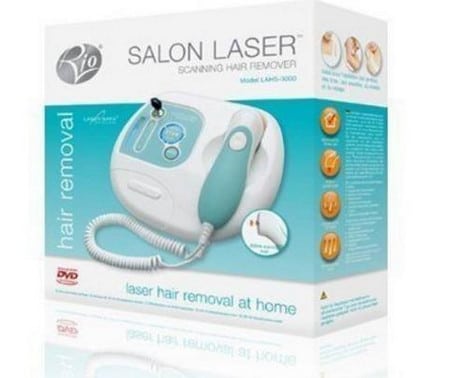
RIO SALON LASER is considered the very first laser epilator for home use.
Prerequisites for successful laser hair removal
Before you start laser hair removal, you should know a little about the nature of hair growth. There are three phases of growth:
What are the contraindications for laser surgery?
In the preoperative consultation, specific detailed tests will be conducted to check for the possible presence of eye diseases that may counter the surgery. Systemic diseases such as collagen diseases, autoimmune diseases and immunodeficiencies. Laser surgery cannot be performed on women who are pregnant or breastfeeding.
Is it possible to have an operation on someone
Eye diseases, including keratoconus, and active eye infections. . In addition, he is over 18 years old with glasses or contact lenses that are stable for one year, and not pregnant or breastfeeding.- anagen - this active phase lasts 2-7 years, ranging from cell division of the hair follicles to hair growth from the dermal papillae: most of our hair is in the anagen phase, in particular the hair on the head;
- catagen is a regressive phase, lasting 10-20 days at which hair stops growing, but does not fall out yet;
- telogen - a phase of rest at which the old hair drops out and grows new.
Laser hair removal is especially effective in the active phase of hair growth, so it is so important to conduct a whole course of procedures to improve the right moment for the final disposal of unwanted vegetation.
How does a laser work in the eye?
Among other previously evaluated features. Only drops of pain-relieving eye drops are used, which are effective in eliminating pain during surgery. With myopia, an excimer laser is applied to the central area of the cornea, removing the tissue to reduce the curvature of the cornea. In farsightedness, the tissue is removed at the periphery of the cornea, increasing its curvature.
How many days before the consultation should contact lenses be used?
In astigmatism, treatment is carried out by flattening or bending the cornea on a given axis. An invisible, unheated ultraviolet ray of light formed and controlled by a computer, can remove layers of corneal tissue with microscopic accuracy. For users of gelatin contact lenses, it is recommended to stay at least 2 days without placing them before the preoperative consultation. People who wear tight contact lenses should stop using at least 5 days before the consultation.
All hairs on the body are in different stages of growth, and if new hairs appear after laser hair removal, it is necessary to repeat the procedure in 2-4 weeks, when the hair moves from the resting phase to the active phase.
Important to remember:
the most optimal length for laser hair removal is from 1 to 3 mm, so it is acceptable to cut or shave the hair shortly before the procedure.
What is the price of laser surgery?
In some cases, the use of contact lenses should be discontinued for a longer period of time if any change in the topography of the cornea is detected. People of all income levels can do the surgery. In addition to the lower price, it is currently possible to set a payment or pay with a credit card.
Calculate how much you will spend on glasses or contact lenses in the coming years, and you will find that the price of laser surgery in the medium term is less than the price of glasses or lenses. To request information on the current price, make an appointment with our specialists. We will be happy to serve you.
Contraindications for laser hair removal
This procedure, such as laser hair removal, there are many contraindications that should be carefully studied so that the consequences do not become detrimental to health.
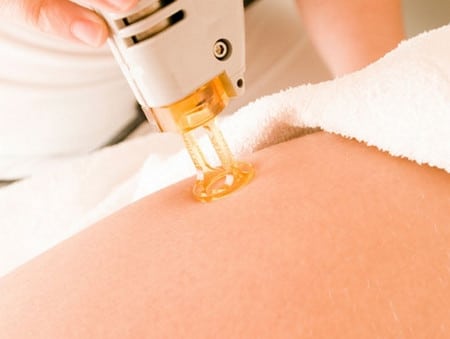
In order to establish whether you have an individual intolerance, it is worth to treat a small area of skin.
Most people should wear reading glasses after 40 years due to the reduced elasticity of the lens that occurs as it ages, called presbyopia. These options will be discussed in a preoperative consultation if you are using vision correction from a distance and are also close so that you can conduct a test to find out the best option for your case. Laser surgery technology has security measures to improve the accuracy of the procedure.
Who can undergo laser refractive surgery?
The excimer laser can be used, in general, to correct up to 13 degrees of myopia, 7 degrees of hyperopia and 7 degrees of astigmatism. These values may vary from patient to patient, as they also depend on other factors, such as thickness and curvature of the cornea. Very thin, very curved corneas or with very low curvature cannot be used. In cases where the patient has a degree higher than the above, with extreme bends or very thin corneas, other surgical methods can be used to correct vision.
Contraindications include:
- malignant diseases, including skin infections;
- chronic and acute inflammatory skin diseases;
- caxap diabet;
- severe hypertension and coronary heart disease;
- warranted expansion of veins and slope to the formation of cell phone branches;
- Acute respiratory viral infection, flu, common cold, acute viral infection in acute form;
- allergic diseases in the acute stage;
- breastfeeding.
Important to remember:
How long after surgery can I return to normal activities?
All these data are evaluated by the ophthalmologist during the preoperative consultation. Patients feel able to perform normal activities the next day after surgery in the vast majority of cases. The first 2-3 days after surgery are those that need more attention. You can watch TV, read and use the computer until the same day of operation. Non-contact physical activity, such as gyms, can be started the day after surgery.
under the age of 18 it is better not to perform laser hair removal, because hormonal imbalance directly affects hair growth.
Such an impressive list of contraindications suggests that laser hair removal should be treated with caution to avoid unpleasant consequences.
Possible negative consequences of the procedure
The side effects of laser hair removal include the following complications:
What is normal to feel after laser surgery?
There may be slight discomfort or dry eyes, and it is easily removed when using eye drops. Almost all patients have photophobia only on the day of surgery. Light at night may exhibit an aggravated glow for several days, or perhaps for several weeks. It is rare that these symptoms persist for more than a few months, that is, in the vast majority of patients, these symptoms appear on the day of surgery, and then gradually disappear.
Does laser surgery have risks?
Laser surgery, when performed under ideal conditions, presents minimal risks of complications in terms of the benefits it can provide. As with any surgical procedure, there are risks. The most common complication that can occur is that there is a residue of the treated degree, that is, hyper or hypocorrection. In most cases, small residual marks can be re-processed after several months if necessary.
- erythema (redness) of the skin;
- perifollicular edema of the treated area;
- pain.
Swelling and redness may occur immediately after a few minutes after the procedure and do not require treatment. The intensity of this reaction depends on the thickness, color and thickness of the hair. The dense flow of energy is absorbed by the hair, it heats up, and redness and swelling are formed. Also, this reaction is observed in patients with sensitive skin. Effective cooling during and after the procedure will help to avoid such consequences.
In any case, most of the resulting complications can be treated and resolved and do not lead to interference in vision. The technique that used the diamond scalpel for the correction of myopia, called radial keratotomy, is no longer used, since it gave few predictable results. Many patients who have been operated on in the past with this method have hyper or hypocorrection. The treatment of these hyper and hip corrections can be performed with the help of laser surgery in most cases.
Are the results of the surgery permanent?
An individual assessment of each case requires medical consultation. Usually the fix is complete and stable. This happens in people who are operated on or not. It is not enough just to be a good brand; the laser excimer should not be too old. If you are a member of the Brazilian Council of Ophthalmology, a member of the Brazilian Society of Refractive Surgery, you should know if you have a specialist in refractive surgery and if you have a specialty in ophthalmology registered with the Regional Council of Medicine.
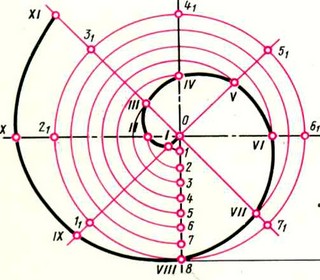
Cream CYTOBI from the line GERnetic International (France) will help to quickly eliminate redness and swelling of the skin after laser hair removal
A professional beautician will be able to correctly choose the intensity of exposure to the skin. If the hyperemia and edema are strongly pronounced, then after the procedure a cream with dexpanthenol or glucocorticoid is prescribed. In most cases, it is enough to apply after-sun creams that do an excellent job with skin irritation.
Serious complications of laser hair removal
The timing of occurrence distinguishes early and late complications after laser hair removal: folliculitis, burns, acneform eruptions and herpes infections in the acute stage, allergic reactions, photophobia, conjunctivitis are referred to as early complications.
Important to remember:
with dark skin, it is better not to use laser hair removal, because the pulse energy is scattered over the skin and does not reach the follicle. Also, do not sunbathe after the procedure in order to avoid increased pigmentation of epilated places.
Burns can occur due to too high density of energy flow, more often burns occur on dark and sensitive skin.
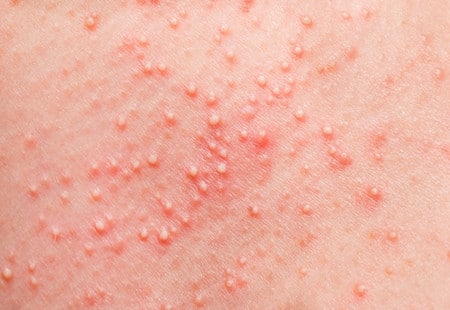
Inflammation of the follicle (folliculitis) occurs in patients with pronounced increased perspiration
Often folliculitis may occur in patients who visit the pool between procedures.
Approximately 6% of the complications after laser hair removal are accneform reactions. Young patients are susceptible to such complications and, as a rule, such a reaction eventually passes without special treatment.
It is logical that if a patient has a history of herpes, then after epilation of the lip zone, a bikini herpes infection may worsen. To avoid this, the day before the procedure is to take an antiviral course of treatment.
Urticaria, allergic dermatitis, cyanosis are allergic reactions to painkillers or skin care products after epilation. Prescribing antihistamines will help deal with this problem.
Neglect of eye protection when epilating can cause catarrhal conjunctivitis, photophobia, eye inflammation, reduced visual acuity. This often happens when processing the eyebrow area, when the goggles make it difficult to carry out the procedure.
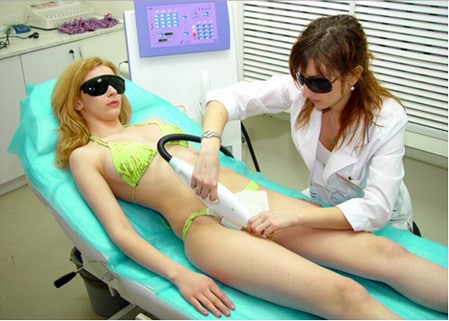
A professional approach to preparing, conducting laser hair removal and skin care after the procedure will help avoid unpleasant complications.
Late consequences and undesirable effects
Late complications after laser hair removal include reduced and increased pigmentation, enhanced hair growth, scars, graying, impaired sweating, degeneration of cells and tissues, nevus dysplasia.
The occurrence of such symptoms can not be alerted, because the manifestation of any of these not only is a noticeable defect, but is often very difficult to cure.
In tanned patients, hypo-or hyperpigmentation occurs, especially if we ignore the recommendations for skin care after the procedure. The use of whitening creams two weeks before the procedure will help to avoid undesirable consequences, as well as the correct choice of apparatus for this type of skin.
If thermal damage to the skin has occurred below the basement membrane and the wound becomes infected, scarring will inevitably occur. Such types of scars as atrophic and normotroficheskie treated with conservative or surgical method, but the pathological scars are very difficult to treat.
Important to remember:
with a tendency to the occurrence of colloidal scars, laser hair removal is better not to.
Absolutely the opposite reaction to laser hair removal - their enhanced growth after the procedure (paradoxical hypertrichosis) occurs when the wrong energy flux density is selected.

If a patient has nevi on the skin, it is better not to carry out laser hair removal in this area, since the probability of their regeneration is very high.
Epilation of the armpits may cause complications such as leukotrichia, bromhydrosis, and hyperhidrosis (graying, impaired perspiration). Only the correct application of laser hair removal technology will help to avoid these consequences.
Preventing the effects of laser hair removal is the main task of a cosmetologist. But the responsibility for possible complications also lies with the patient. Before the procedure, you should consult a doctor and not hide your diseases and disturbing symptoms. Negligence can lead to very sad consequences.
The visual organ is considered the most susceptible to the effects of any harmful factors, with the result that the vision gradually falls. And some causes can lead to total blindness. But in order to prevent this, many methods have been developed in ophthalmology to restore it. One of these is laser vision correction.
About the effectiveness of this method says a lot. After all, laser vision correction is a painless and effective procedure. It helps to get rid of problems such as astigmatism, hyperopia and myopia.
In its application, laser is quite simple. First, the specialist develops an individual program depending on the structure of the eye and the associated disease. During the procedure, the removal of the surface layer of the cornea. Then, using a laser, perform the appropriate operations. At the end of the correction, the removed shred is returned to its place. The edges of the operated shells coalesce fairly quickly.
Patients with various eye pathologies should remember that laser vision correction is capable, and the probability of occurrence of complications is minimized. But at the same time eye surgery does not relieve the patient of many factors that lead to a deterioration of the visual function. Therefore, it is necessary to conduct a survey and clarify with the doctor about the feasibility of these manipulations.
Possible complications after laser vision correction
It is very important to know what complications after laser vision correction may occur. These include.
- Puffiness and inflammation of the visual organs.
- The feeling of a foreign object in the eye.
- Impaired visual function.
- Corneal opacity.
- Keratoconus
- Fluctuations of visual acuity.
- Diplopia
- Increased susceptibility to light.
- Posterior negoidal exfoliation.
- Erosion of epithelial tissue.
- The corneal flap layer is too thin.
- The bias of the treated area.
And this is not all the consequences of laser vision correction. It all depends on the body's response to what is happening.

Limitations after laser vision correction
In order for the recovery period to go much faster and without consequences, you need to observe the limitations after laser vision correction, which includes the following points.
- Use of any cosmetic products, especially those applied to eyebrows and eyelashes.
- Visiting ponds, saunas and pools.
- Exposure to ultraviolet rays. In this situation, when going outside it is worth wearing sunglasses.
- Acceptance of water procedures in the form of washing the face and washing the head for four days.
- Planning to conceive a baby for six months after the manipulation.
- Watching TV, sitting behind the monitor, reading.
- Driving a car in the dark.
- Rubbing the skin around the eyes, otherwise penetration of the infection is possible.
Also, patients should not take alcohol after laser vision correction for seven days. During the period of rehabilitation should be limited to physical exertion, and sleep is recommended lying on your back.
Causes that may affect the deterioration of visual function
Many patients say that after correction the vision may deteriorate. Indeed it is. But visual impairment after laser correction is quite normal. It passes after a period of recovery. But if after the operation, pain and burning sensation appeared, then this is a bad sign and an urgent need to visit a doctor. Such factors may affect visual impairment after laser correction.
- The reasons that caused the fall of the visual function before the procedure were not removed. It should be noted that the operation of this type is only aimed at improving vision, but not at eliminating the very cause. Therefore, if the patient had a disease of a progressive nature, then the vision will further inevitably fall.
- Non-compliance with those recommendations that were appointed before the operation. Every patient should remember that it is necessary to follow all the instructions prescribed by the doctor. It is important to understand that it is impossible to consume alcohol before the operation, use makeup for several days and remove the lenses a week before the procedure.
- Non-compliance with the recommendations that were given after the operation. During the rehabilitation period, you must use special eye drops, sleep only for a few days on your back, do not read and sit at the computer for a long time.
- After surgery, complications may occur, which also includes a temporary deterioration in visual function. Within a few days all the discomfort will go away by itself.
- In the rarest of cases, a medical error occurs. Therefore, when the manifestation of discomfort is worth talking to all the doctor.
If the patient's eyesight after laser correction, then all the fault. Unfortunately, in such a situation, it is almost impossible to do something until the vision is at one value for one year.
Also, the visual function after the operation may fall due to detached retina. Some experts argue that it is impossible to carry out this procedure. But everything is not as sad as it would seem. The process of soldering the retina will occur for several months until the visual organ returns to normal. After that, you can carry out laser correction. But not in this case, you need to visit the doctor as often as possible.
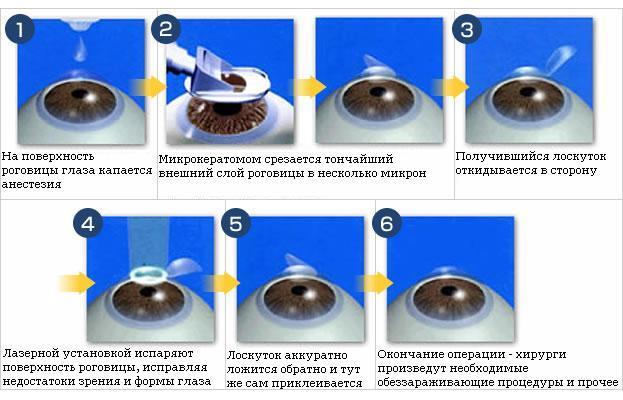
Laser vision correction surgery
When the patient is to undergo LASIK surgery, you need to go through all the preparatory activities and consult with your doctor. On the day of the operation, drops with an anesthetic substance are dropped into the eyes of the patient, due to which the patient does not feel anything. Then make the installation of a special eyelid extender. This is necessary so that the eye is wide open and does not twitch. A bright light will shine into the patient's eyes, and within a few minutes he may hear clicks. There is nothing terrible in this, because at this time the doctor removes the surface layer of the cornea, leads the appropriate manipulations to improve the refraction and puts in place the cut layer of the shell. All manipulations take place within fifteen minutes.
An important prerequisite for a successful operation and obtaining an excellent result is that during the laser exposure you cannot make head movements, blink an eye and look ahead to a green dot.
Twenty minutes after the operation, the patient may feel tearing, which will last up to six hours. Other discomfort should not arise. Already after correction of the vision, the patient will see much better. In some situations, on the first day, the visual function is still a little blurred after a night's sleep. But the full recovery after laser vision correction comes in two or three days.
Immediately after laser vision correction you can not do the following.
- To go home until the doctor has examined the patient. It will be possible to leave only an hour after the operation, when the anesthetic drug will pass and the patient's condition normalizes.
- Touch the visual organ with your fingers, rub and scratch them. If you have any discomfort in the form of dryness or redness of the eyes, it is better to use drops.
- Strain your eyes. Irritation of the visual organ can occur due to long watching TV, sitting at the monitor or reading a book.
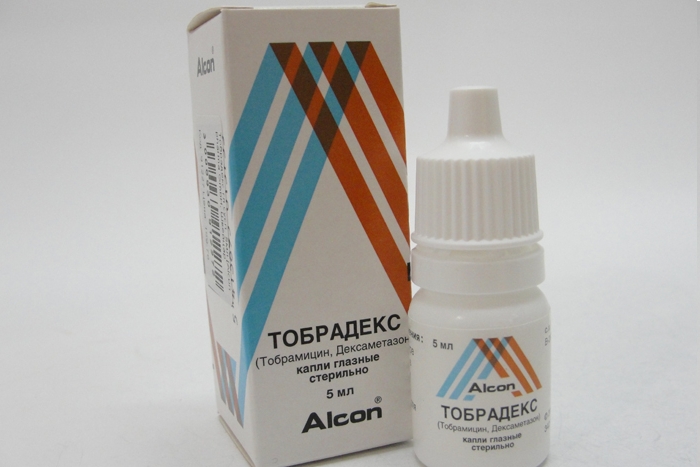
Diagram of using eye drops after laser vision correction
After surgery, the laser is recommended to use eye drops. You can bury them as yourself or ask for help from loved ones. The main thing is to comply with all hygiene rules before the procedure. To do this, wash your hands thoroughly with soap and water. Then without touching the eyelids with hands, drip the medicine into the formed crack and cover the eye for a few minutes. The same actions are performed with the second eye, if surgery was performed simultaneously. Most doctors prescribe such. Apply it as follows.
- The first three days after surgery five times a day, two drops in each eye.
- The next three treatments are reduced to four times per day.
- In the last three days, manipulations need to be carried out three times a day, one drop each.
Also, as an additional therapy against the dryness of the eyes, tear-containing preparations are prescribed in the form from the second day after the correction. They must be dripped within thirty days, up to three times a day.
If the doctor has prescribed more than two topical medications, then an interval of at least five minutes must elapse between instillations.
Contraindications to laser eye surgery
Any patient with poor eyesight is interested in the limitations of the operation with a laser. These include the following.
- Children age up to eighteen years.
- Pregnancy and lactation period.
- Weakened primary and secondary immunity.
- Systemic diseases that can affect the healing of the eyes.
- Diseases of the autoimmune type.
- Thinning of the cornea.
- Glaucoma, cataracts and keratoconus.
- Progressive myopia.
- Peeling of the retina.
- Diseases of the visual organ of an inflammatory nature.
- Pathological conditions associated with the cornea.
- The presence of pacemakers.
- Diabetes and any other diseases of the endocrine system.
- Rheumatism.
- Changes in the retina.
- Diseases of an acute or chronic nature that affect the anterior and posterior part of the eye.
Myths about laser vision correction
Currently, laser vision correction is becoming increasingly popular. But some patients still prefer to wear glasses and soft lenses. After all, there are several myths that need to try to dispel:
- There is an opinion that making the correction hurts. This is all untrue. The procedure is painless for the patient, because anesthetic is instilled before the procedure. Only after surgery can there be discomfort that will disappear in a few hours.
- Vision may deteriorate even after laser correction. Drastic deterioration to this day has not yet been recorded. Such a situation can occur only with progressive myopia, if the doctor did not notice it in time.
- Before the baby is born, it is not recommended to do a laser procedure, since after birth the eyesight may drop again. Partly this statement is true. Doctors recommend getting pregnant after the operation only six months later. The fact is that the visual organ is experiencing strong loads during the procedure, and when carrying a baby.
- After surgery with a laser will have to lie in the hospital. At the present time, the laser procedures make it possible not to lie in hospital for a long time, but to go home in two hours. Before carrying out the manipulation of the patient anesthetic is dripping, the action of which ends already through. And the correction itself lasts no more than fifteen minutes.
- Correction laser threatens loss of vision. Complications can occur with any kind of manipulation. This also applies to laser correction. The probability of occurrence is between three and seven percent, which includes blurred vision, burning, pain and tearing. The risk of serious complications and loss of visual function is reduced to zero.
In order for the laser correction to be successful, and the vision has returned to normal, it is necessary to undergo a thorough examination and follow all instructions of the treating doctor. After surgery, an ophthalmologist is recommended to visit on the first and seventh day, after a month, and then every six months.
- In contact with 0
- Google+ 0
- OK 0
- Facebook 0

